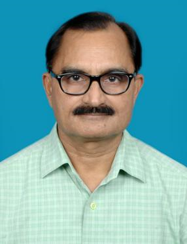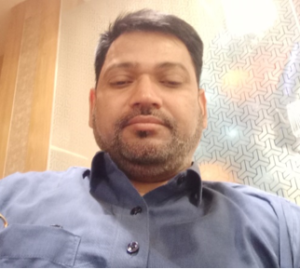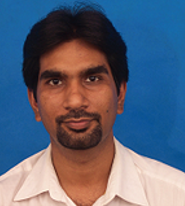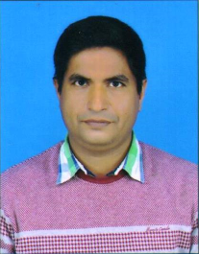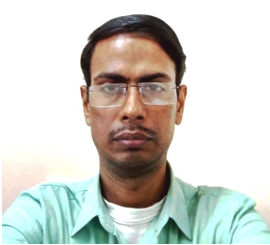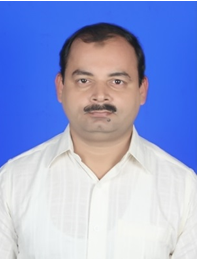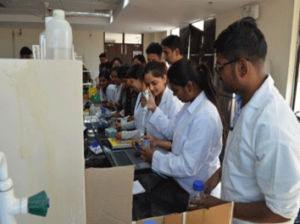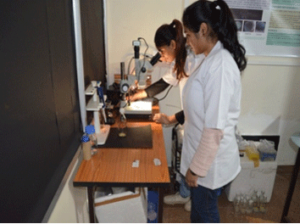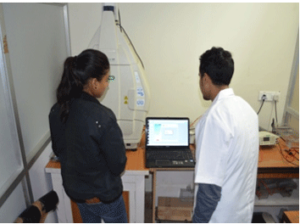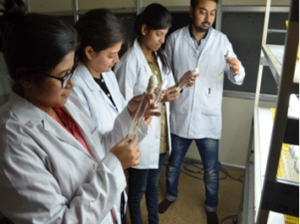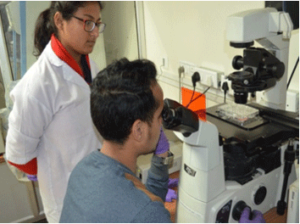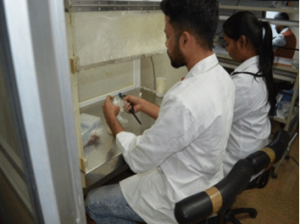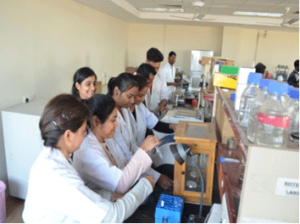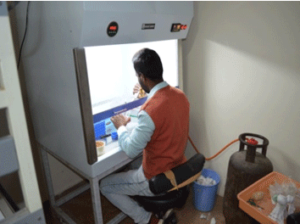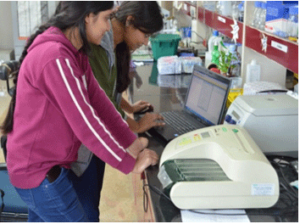The Department of Biotechnology is DST-FIST sponsored and is currently offering Ph.D. and M. Sc. Biotechnology programmes. These Programmes include well-designed theory and practical courses. Innovation-based training is the key to train students with a special emphasis on understanding the basic as well as modern concepts in biological processes for pursuing research in frontier areas of Biological Sciences. The Postgraduate Programmes equip students with deep theoretical as well as practical understanding of different aspects of Biological processes and promote them to take on an integrative approach for their studies and research.
Biotechnology has emerged as a major thrust in the field of science and technology having potential to boost the economy of several countries including India. The voice of global Biotechnology in 21st century is to transfer the bio-based technology from “Lab to Land and from Bench to Business” to bring the cost of bio-based commodities within the reach of common man. The courses in Department of Biotechnology are mainly related to recent and emerging trends in Biology but the students are also taught Biostatistics and Bioinformatics which enable them to analyse their data, draw meaningful conclusions and publish in reputed journals. The Programme equally gives emphasis on integrated approaches in the basic and applied biology viz. Olfaction, human health, recombinant DNA technology, transgenic development, bioremediation and informatics. Students work directly with faculty on real-world projects, gaining hands-on skills necessary to solve emerging problems.
Currently, departmental research is mainly focused in the areas of Cancer Biology, Autoimmune Diseases, Fungal Diseases, Lung Physiology, Behavioural and molecular Neuroscience, Immunology, Genetic Engineering, Stem Cell Therapy, Proteomics, Molecular Biology, Signal Transduction, Interferon (IFNs) Transcription Factors, Biochemistry of Fungal Pathogens and Genesis of Secondary Metabolites as well as Genetic manipulations of Plants which include Plant Tissue Culture and Molecular Marker Developments. Apart from above advantages, M.Sc. Biotechnology Programme prepares the students to be the leaders in research, policy and business.
The department of Biotechnology is equipped with state-of-the-art technology and equipment that provide a stimulating environment for teaching and research. The department of Biotechnology is actively involved in research by having the distinction of running more than 10 externally funded R & D projects sanctioned from various Government agencies.
News and Announcements
Board of Studies (BoS)
BoS is a statutory body for each department/centre, primarily responsible for syllabus design and regular update. As described in the Ordinance section 25.10,
The functions of the Board of Studies shall be:-- To recommend to the School Board, courses of studies offered by the Department/Centre and continue updating syllabus;
- To take all steps in accordance with the provisions of the Regulations about teaching and evaluation of various courses/programmes of the Department/Centre;
- To recommend to the School Board measures for the improvement of teaching and research in the Department/Centre;
- To constitute panels of experts to be considered for appointment as Examiners, Board of Examiners for various courses/academic programmes and M.Phil./Ph.D. thesis representing various specializations of Departments/Centres; and
- To perform such other functions as may be assigned to it by the School Board, the Academic Council, the Executive Council and the Vice-Chancellor.
Notification of Constitution of Board of Studies 
Department Committee (DC)
As enshrined in the Ordinace-26, the Department/Centre Committee (DC/CC) shall consist of the Head of the Department/Centre, as Chairperson ex-officio, and all faculty members of the Department/Centre.
26.2 The Department/Centre Committee shall have the following functions, namely–- To make proposals to the Board of Studies on academic programmes concerning teaching and research, and the creation, specialization and abolition of teaching posts;
- To propose schemes for the maintenance and improvement of the standards of various programmes of study and research of the Department/Centre;
- To apportion the teaching and co-curricular work of the Department/Centre among the teachers thereof and monitor the proper execution thereof;
- To consider and decide on the assignment and utilisation of the space, equipment and other assets of the Department/Centre and other matters of general and academic interest of the Department/Centre;
- To consider and recommend perspectives and major thrust areas for research and to propose research projects to be taken up by the members of the Department/Centre, individually/collectively;
- To review and apprise the SRC/URC with the current status of research in Department/Centre;
- To suggest to SRC/URC norms related to qualifications and research experience of a faculty to be recognized as a research degree supervisor and to constitute Department/Centre Research Degree Committee (DRC/CRC);
- To suggest to University Admission, Teaching and Evaluation Committee (UATEC) on any issue related to admission, teaching, continuous evaluation in courses and students’ assessment of courses, offered by the Department/Centre to improve quality of education.
- To constitute such Committee(s) comprising members of the Department/Centre, and if necessary external experts, for framing and implementation of rules and regulations related to admission, teaching, continuous evaluation, maintenance of students’ records including alumni affairs as well as promotion of research and development; and
- To perform such other functions as may be assigned by the Ordinances or Regulations, or by the Vice- Chancellor/Dean/School Board from time to time.
Department Research Degree Committee (DRDC)
Departmental/Centre Research Degree Committee (DRDC/CRDC) deal with all matters connected with the Ph.D. Programme of the Department and report the matter to the University Research Degree Committee (URDC), as per University Ordinance-33. It consists of the Head of Department/Centre as Chairman and other faculties in the department.
Functions of DRDC/CRDC are as follows:- Allotment of Supervisor, Co-Supervisor, recording reasons for not admitting a candidate.
- Recommendation for extension of time for submission of thesis
- Recommendation to peruse a part of research outside the University
- Approval of the Course Work
- Assessment and Grading in Course Work
- Monitoring the research progress of the candidate
- Approval of Research plan proposal/language
- Sanction of duty leave to the Ph.D. candidate
- Assessment of Ph.D. work through pre-submission seminar
- Maintaining the record of research paper publications of the candidate
- 11 Recommendation of panel of experts for thesis evaluation
- Assessment of revised thesis for satisfactory compliance, if any
- Arrangement of Viva-voce in the absence of the supervisor
- Recommendation to waive the Viva-voce
Notification of Constitution of DRDC 
Research Advisory Committee (RAC)
A Research Advisory Committee (RAC) is constituted for every research scholar admitted in PhD programme. The Committee would guide the research scholar to develop the study design and methodology of research and to To periodically review and assist in the progress of the research work of the research scholar. The committee shall have also have power to recommend the co-supervisor and cancellation of registration
Notification of Constitution of RAC for- PhD students Jan2019 batch

- PhD Jul 2019 pdf

- PhD Sep 2020 pdf

Miscellaneous Department Committees
- Department Library Committee

- Local Purchase Committee

- Time Table & Workload Committee

- Discipline committee
- Student attendance and grievance committee
- Department placement committee
- Alumni committee
- Seminar Committee
- Objectives of the Program : The two year (four semesters) Post-Graduate Programme has interdisciplinary approach with participation of faculties/researchers across the University with Choice based Credit System (CBCS). Hands-on training with professional and management skills are keys to our teaching pedagogy. This Programme focuses on responsibility building and ethics in research and policy. We are equally giving emphasis on integrated approaches in human health, transgenic crop development, environmental sciences and informatics. The course also comprises of project dissertation, presentation and comprehensive viva-voce as part of evaluation system. Students also visit major research institutes in the form of educational tour and Biotechnology industries to learn various aspects of product developments.
- Program Outcomes : The major goals of the Biotechnology Programme is to engage students by actively involving them in cutting-edge research.
- Eligibility : Bachelor degree in Biotechnology or any branch of Biological Sciences (Microbiology, Biochemistry, Bioscience, Environmental Science, Biomedical etc.), B. Sc. (Hons) in Zoology, Botany & Chemistry or B.Sc. three year pattern with any of the two subject among Zoology, Botany & Chemistry in 3rd year,B. Tech in Biotechnology. Candidates must have minimum of 55% marks for General/OBC candidates and 50% marks for SC/ST candidates in the qualifying degree.
- Intake : 45
- Objectives of the Program : The Department of Biotechnology iscurrently offering PhD with diverse field of specializations including Neurobiology, Cancer Biology, Plant Biotechnology, Bioremediation, Infection Biology, Stem cell Biology, and Immunology.
- Program Outcomes : Department of Biotechnology equip researchers with deep theoretical as well as practical understanding of different aspects of Biological processes and promote them to take on an integrative approach for their studies and research. The students are well trained for both dry and wet-lab techniques enabling them to better suit for different research laboratories and industries which look for personnel well-taught in programming languages, can do molecular modelling and also have abilities to work on bench producing raw data to analyse further using various Biotechnology tools.
- Eligibility : Master Degree in Biotechnology/ Pharmaceuticals Science/ Medical Science/ Agricultural Science/ Chemistry/Physics/ any branch of Biological Science (Microbiology, Biochemistry, Molecular Biology, Human Genetics, Life Science, Bioscience, Environmental Science, Biomedical, Zoology, Botany) with a minimum of 55% marks for General /OBC candidates and 50% marks for SC/ST candidates in the qualifying degree.
The syllabus was framed with a great care so that the theory, practical and tutorials would meet the requirement of such a challenging and demanding field. Innovation-based training is the key to train students with a special emphasis on understanding the basic as well as modern concepts in biological processes for pursuing research in frontier areas of Biological Sciences.
- Lab facility
- Research Lab :
- List of instruments in the Lab
- Lab staffs and their contact
Biotechnology Laboratory is equipped with state of the art technology and equipment that provide a stimulating environment for teaching and research. The list includes multiple Biosafety Cabinets, Laminar Air Flow, Autoclave, Water bath with wide temperature ranges, Dry Block Heater (Heating Block), Rotatory Shaker, Stackable Incubator Shaker, Cell Sonicator, Many types of Microscopes (Fluorescence, Inverted, Compound and Normal), various types of refrigerated Centrifuges, Nano Drop UV/VIS Spectrophotometer, ELISA Plate Reader, Spectrophotometer, Gradient Thermal Cycler, Real-Time PCR, UV/VIS Transilluminator, Gel Documentation Systems, Electrophoresis units (Horizontal and Vertical), Blot Transfer System, Deep Freezers (-200 C and -860 C), Ice-Flakes Machine, Cryo-Can, Lyophilizer, Complete Milli-Q Water System etc. Facilities for animal, plant and microbial culture work are also available.
| Sl. No. | Name of Instruments |
|---|---|
| 1 | Weighing Balance Fine and Coarse |
| 2 | Binocular Microscope |
| 3 | Biosafety Cabinet |
| 4 | Biosafety Cabinet (Rescholar) |
| 5 | BOD Incubator |
| 6 | Camera with accessories |
| 7 | Centrifuge 5418 |
| 8 | Centrifuge 5418, Eppendorf |
| 9 | Centrifuge 5418R, Eppendorf |
| 10 | Chemi Doc MP system, Gel Documentation |
| 11 | CO2 Incubator |
| 12 | Cryo Can 1.6L, 10.5L, 20.5L |
| 13 | Deep Freezer (-20⁰C) |
| 14 | Deep Freezer (-86⁰C) Freezer |
| 15 | Deep Freezer Voltas |
| 16 | Digital Magnetic Stirrer Hot Plate Tarson |
| 17 | Dual Adjustable Slab Gel Unit |
| 18 | Electronic Balance |
| 19 | Eppendorf PCR Machine |
| 20 | Freeze Dryer (Lyophilizer) |
| 21 | Gradient PCR Palm Cycler |
| 22 | Heating Block |
| 23 | Horizontal Electrophoresis Unit- Mini Sub Cell GT System |
| 24 | Hot Plate |
| 25 | Hybridization/Orbital Oven |
| 26 | Ice Flacking Machine |
| 27 | Imark Microplate Absorbance Reader with Microplate Manager software |
| 28 | Incubated Shaker |
| 29 | Induction Top |
| 30 | Inverted Research Microscope with other accessories |
| 31 | Laboratory Incubator |
| 32 | Laminar Air Flow |
| 33 | Magnetic Stirrer with Hot Plate |
| 34 | Microprocessor-based pH meter |
| 35 | Microscope Olympus |
| 36 | Microwave Oven |
| 37 | Mini Centrifuge |
| 38 | Mini Spin |
| 39 | NanoDrop UV/VIS Spectrophotometer |
| 40 | Nucleic Acid Electrophoresis Unit (10x12 – 11x12 cm) |
| 41 | Nucleic Acid Electrophoresis Unit (6.7 – 7.8cm) |
| 42 | Orbital Incubator Shaker, Orbitek LETTH |
| 43 | PH Meter |
| 44 | Plant Tissue Culture Rack |
| 45 | Proflex PCR System |
| 46 | Projector Multimedia with accessories with screen |
| 47 | Refrigerated High-Speed Table Top Centrifuge with Changeable rotor |
| 48 | Refrigerated Microcentrifuge, Tarson |
| 49 | Rocker/Rotary Shaker |
| 50 | Sonicator |
| 51 | Stereo Zoom Trinocular Microscope |
| 52 | Table Top Refrigerated Centrifuge |
| 53 | Thermal Cycler VERITY 96 Well |
| 54 | Tissue Culture Rack |
| 55 | Trans-Blot Turbo |
| 56 | Transilluminator |
| 57 | Trinocular Microscope |
| 58 | UV-Vs Spectrophotometer |
| 59 | Vertical Gel Electrophoresis Unit- Mini Sub Cell GT System |
| 60 | Vortex Mixture |
| 61 | Water Bath Shaker |
| 62 | Water Bath, Low-Temperature Circulating. |
| 63 | Water Purification System |
| 64 | X-Cell Sure Lock Mini Cell |
- Project
- Dr. Vijay Kr. Singh PI, SERB (2016-20; 14 Lakh) project entitled Identification of molecular species that have potential to compete with insulin for receptor binding
- Dr. Durg Vijay Singh PI UGC (2013-15; 6 lacs) project entitled Design and development of inhibitors against Nucleotide Binding Domain of P-gp for enhancing Bioavailability and reversal of multidrug resistance
- Dr. Durg Vijay Singh, PI,DST Kiran (2014-15; 3.26 lacs) project entitled Design and Development of herbicide against carboxyl-terminal (CT) domain of ACCase of P.minor to regain resistivity in resistance biotypes
- Dr. Durg Vijay Singh PI DST (2016-19; 35 lacs) project entitled Design and Development of Herbicide to Regain Sensitivity in Phalaris Minor Resistant Biotypes
- Dr. Durg Vijay Singh PI, ICMR (2020-ongoing; 50 lacs) project entitled Rational approach of antibiotic discovery and development against, a staphylococcus aureus serine threonine phosphatases (Stp) protein (Project ID RP-60).
- Dr. Ajay Kr. Singh, PI Dr. Anil Kumar (Co-PI) ICMR (2019-Ongoig; 35 lacs) project entitled In-Silico study on potent inhibitors against iron overload and cardiac arrhythmia in beta thalassemia (RP-56).
- Dr. Vijay Kr. Singh Dr. K.K. Ojha (Co-PI) ICMR (2020-Ongoig; 20 lacs) project entitled Gene interaction landscape inferred from expression data to search for diabetes effector molecules (Ref. 2020-3854)
- Book: Pandey J.&Vishwakarma. R. (2014). Women Empowerment and Gender Equality Development. 978-93-80310-78-7, New Generation Press, New Delhi
Department of Biotechnology
- Present Head
| HOD Name | Period | Contact | Image |
|---|---|---|---|
| Prof. Rizwanul Haque | 2020-Onwards | Contact : +91 - 8581800619 Email: rhaque@cub.ac,in |
- Former Heads
- Lorem Ipsum (2020-2021)
- Lorem Ipsum (2020-2021)
- Lorem Ipsum (2020-2021)
| Office Staff | Email Id | Contact | Image |
|---|---|---|---|
| Manish Raj, UDC | +91-9122446390 | manishraj@cub.ac.in |

